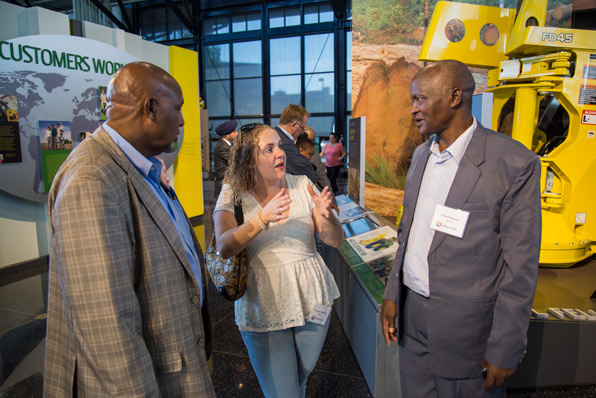
Hailing from Zimbabwe to Uruguay and more than a dozen points in between some 40 agricultural advocates gathered Sept. 18-23 in the first Alliance for Science training session developed solely for farmers.
The week-long course, held in America s heartland at Rock Island, Ill., was offered in response to requests from farmers seeking skills that can help them effectively express their needs and interests to a global public and policy-makers. Training focused on communications and grassroots organizing.
Equally valuable was the networking and sharing that took place among the seasoned farmers, who are already active internationally in agricultural education and outreach efforts. Though some cultivate thousands of acres and others a few hectares, and some raise animals while others grow crops, they have many common interests and concerns.
Chief among them is the desire for access to technology that can make farming more efficient, productive and profitable. Because despite the passion that fuels their work, the bottom line for all is the bottom line.
Farming is first and foremost a business, said Eve Tepsy Ntseoane, a maize (corn) and cattle producer in South Africa. It must be profitable to be sustainable.
As farmers struggle to succeed in an unpredictable economic, social and meteorological climate, they are increasingly joining forces to ensure that their perspectives are heard. Though just 2 percent of the US population actively farms, that figure rises dramatically in developing nations. In sub-Saharan Africa, for example, 60 percent of the workforce is employed in agriculture, including many children, according to a report by the Food and Agriculture Organization.
Yet too often farmers voices are muted as policy-makers listen instead to those who have strong opinions, but little understanding of agricultural practices and challenges.
Everybody likes to talk about what farmers need, said Balwinder Kang, who grows GM cotton and other non-GM crops in Rajasthan, India. But nobody asks the farmers.
During the training, the Alliance for Science multimedia team made a point of asking farmers what they need, what challenges they face, what they re doing to advance agriculture and what they want people to know about their avocation/occupation.
Their responses varied, and will be developed into a series of blog posts and videos. But they consistently expressed a desire for greater public recognition that farmers know what they re doing, and love both the land and their animals.
Georgina Gutierrez, a dairy farmer in Mexico, expressed it well when she said that activist allegations that ranchers and farmers don t truly care about stewardship are like a knife in our hearts. Everything we do is for the benefit of our animals, our land.
Invariably, those participating in the course said they chose agriculture often at the expense of pursuing other, more lucrative careers because they cherish their relationship with the livestock and crops they tend.
They also spoke of a tendency by non-farmers to romanticize agriculture, which typically translates into a call for farmers to abandon technology and return to imaginary bucolic times.
Those weren t the good old days, said AD Alvarez, who is growing genetically engineered, pest-resistant Bt maize in the Philippines. They consigned a lot of people to poverty.
They also exposed a lot of farmers and farm families to pesticides, which were sprayed to control pests that can now be thwarted through genetically-engineered crops. The technology also has been used to develop traits like drought-tolerance and herbicide resistance, which eliminates the drudgery of hand weeding often imposed on women and children.
Other farmers spoke of being able to send their children to school, refurbish their homes, expand their plantings and invest in equipment using profits realized from growing more productive GE crops.
Invariably, they want to be the ones who select the technology and practices that will help them to not just survive, but realize their dreams, and they chafe at attempts by activists to restrict their freedom of choice.
The intensive training in Illinois of farmers and business leaders is yet another layer of brick-work in the new wall for resilience against poverty, hunger and malnutrition, for which we applaud the Cornell Alliance for Science, wrote Peter Wamboga-Mugirya, a small-scale farmer who grows chilies and cassava in Uganda, in an email to the group. Like several other Africans, he was inexplicably denied a visa to attend the course.
Of course, the hurdles in acquiring visas for us from developing to developed countries calls for greater understanding and strengthened cooperation by the people of the North and those in the South, Wamboga wrote. The people-to-people ties that [the Alliance] is nurturing more so between community leaders in the developing south and those in the United States is a direct contribution to the overall global attainment of socio-economic development, peace and stability.
Joan Conrow is the managing editor of the Cornell Alliance for Science.
